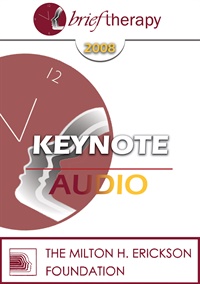
- Average Rating:
- Not yet rated
- Topic Areas:
- Keynotes | Brief Therapy | Therapeutic Relationship | Therapist Development
- Categories:
- Brief Therapy Conference | Brief Therapy Conference 2008
- Faculty:
- David Burns, MD
- Duration:
- 26:45
- Format:
- Audio Only
- Original Program Date:
- Dec 14, 2008
- Short Description:
- Dr. Burns will describe disturbing new research on the accuracy - or lack of accuracy - or clinician's perceptions of how our patients feel - and how they feel about us. He will illustrate new, brief, highly accurate assessment instruments that can dramatically boost your clinical understanding and effectiveness.
- Price:
- $15.00 - Base Price
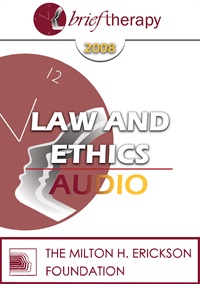
- Average Rating:
- Not yet rated
- Topic Areas:
- Law & Ethics | Therapist Development
- Categories:
- Brief Therapy Conference | Brief Therapy Conference 2008
- Faculty:
- A. Steven Frankel, PhD, JD, ABPP
- Duration:
- 3:23:59
- Format:
- Audio Only
- Original Program Date:
- Dec 10, 2008
- Short Description:
- The Law and Ethics Workshop covers emerging legal and ethical issues for mental health practitioners of all disciplines. The four-hour program addresses issues including confidentiality and privilege, note-taking, record-keeping, coping with subpoenas, the impact of professional society ethical codes on regulation of mental health practice, liability exposure with suicidal patients, and recent developments in “Tarasoff situations.”
- Price:
- $15.00 - Base Price
Tags: Ethics Law Therapist Development
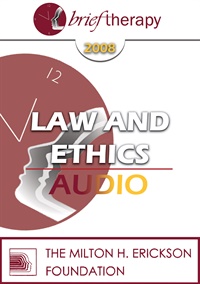
- Average Rating:
- Not yet rated
- Topic Areas:
- Law & Ethics | Therapist Development
- Categories:
- Brief Therapy Conference | Brief Therapy Conference 2008
- Faculty:
- A. Steven Frankel, PhD, JD, ABPP
- Duration:
- 1:38:17
- Format:
- Audio Only
- Original Program Date:
- Dec 10, 2008
- Short Description:
- This program focuses more closely on the needs of clinicians who fall into particularly high risk groups. Topics include confidentiality and privilege for children, coping with high-conflict divorce/custody families, the regressive impact of the regulatory environment on family therapy in particular, supervision/consultation issues that arise for professionals whose agency positions may include functions that conflict with ethical codes.
- Price:
- $15.00 - Base Price
Tags: Ethics Law Therapist Development
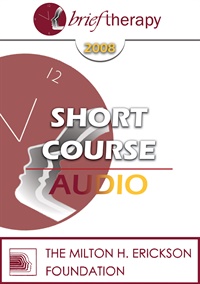
- Average Rating:
- Not yet rated
- Topic Areas:
- Short Courses | Brief Therapy | Consciousness | Resources | Therapist Development | Unconscious Processes
- Categories:
- Brief Therapy Conference | Brief Therapy Conference 2008
- Faculty:
- James Rini | Melissa Rini, MS
- Duration:
- 1:24:29
- Format:
- Audio Only
- Original Program Date:
- Dec 11, 2008
- Short Description:
- Fuzzy Focus is a method that therapists can use to bring about quick and effective results. Fuzzy Focus is a process whereby unconscious resources are accessed by disrupting existing mind-sets, which are keeping alternative frames of reference unavailable. To use Fuzzy Focus effectively, therapists must be grounded with a coherent understanding of human nature and human consciousness. This workshop teaches the participant Fuzzy Focus as well as the theoretical framework needed to use Fuzzy Focus.
- Price:
- $15.00 - Base Price
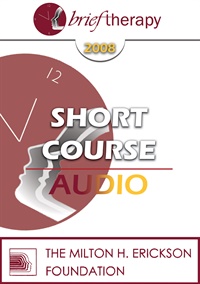
- Average Rating:
- Not yet rated
- Topic Areas:
- Short Courses | Brief Therapy | Communication | Stress | Therapist Development
- Categories:
- Brief Therapy Conference | Brief Therapy Conference 2008
- Faculty:
- Seth Kadish, PsyD
- Duration:
- 1:12:50
- Format:
- Audio Only
- Original Program Date:
- Dec 11, 2008
- Short Description:
- The "Pointing Out Patterns" approach is a three-phase, nine-step process, which addresses the negative patterns of thinking and behavior that cause clients intrapsychic and interpersonal stress. The clinician rapidly observes and reveals these negative patterns, e.g., entitlement, intimidation, people-pleasing, etc., to the client, in a caring, supportive and straightforward manner, and assists the client in quickly diminishing, or eradicating negative patterns of thought and behavior.
- Price:
- $15.00 - Base Price
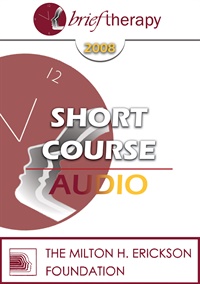
- Average Rating:
- Not yet rated
- Topic Areas:
- Short Courses | Community | Therapist Development
- Categories:
- Brief Therapy Conference | Brief Therapy Conference 2008
- Faculty:
- Les Blondino, LPC, LMFT
- Duration:
- 1:27:13
- Format:
- Audio Only
- Original Program Date:
- Dec 11, 2008
- Short Description:
- Today, prudent therapists learn not only to influence client's interactions within their natural social context, but also influence their interactions with the helping system. In this workshop, the problematic relations between helping and family systems and strategies to change them will be described. Three areas will be explored: 1) humanistic approach to services; 2) correcting the family hierarchy; 3) boundary building.
- Price:
- $15.00 - Base Price
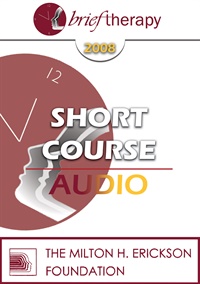
- Average Rating:
- Not yet rated
- Topic Areas:
- Short Courses | Therapeutic Relationship | Therapist Development | Brief Therapy
- Categories:
- Brief Therapy Conference | Brief Therapy Conference 2008
- Faculty:
- Lilian Borges, MA, LPC
- Duration:
- 1:19:50
- Format:
- Audio Only
- Original Program Date:
- Dec 11, 2008
- Short Description:
- This short course will approach therapist sculpting as an experiential tool based on the idea that dynamic experiences precede dynamic understandings. The presenter will offer an integrative approach to problems that is brief, experiential, phenomenological and effective. Therapist sculpting allows the therapist to empathize with the client; helps the client to disengage from the problem and focus on what is important; and helps the client discover new possibilities.
- Price:
- $15.00 - Base Price

- Average Rating:
- Not yet rated
- Topic Areas:
- Short Courses | Resistance | Brief Therapy | Therapeutic Relationship | Therapist Development
- Categories:
- Brief Therapy Conference | Brief Therapy Conference 2008
- Faculty:
- Clifton Mitchell, PhD
- Duration:
- 1:26:07
- Format:
- Audio Only
- Original Program Date:
- Dec 11, 2008
- Short Description:
- Building from the premise that clients are always cooperating and that resistance is created from the interaction style of the therapist, this presentation will present ten foundational principles for managing resistance from a social interaction theory perspective. The primary focus will be on managing resistance at pivotal points in the therapeutic dialogue.
- Price:
- $15.00 - Base Price
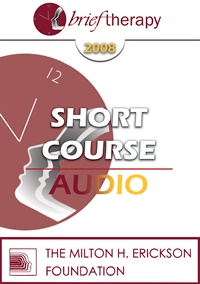
- Average Rating:
- Not yet rated
- Topic Areas:
- Short Courses | Brief Therapy | Goals of the Therapist | Metaphors | Therapist Development
- Categories:
- Brief Therapy Conference | Brief Therapy Conference 2008
- Faculty:
- Christine Guilloux, DESS Psychology
- Duration:
- 55:10
- Format:
- Audio Only
- Original Program Date:
- Dec 11, 2008
- Short Description:
- Subject, patient, client, therapist, teacher, trainer, supervisor, supervised; all of us are shaped from an essence, the stuff we are made of, the hero within. This workshop will offer ways to utilize our hidden heroes in our therapeutic goals for inner change, and help the patient build from the hero within him/herself.
- Price:
- $15.00 - Base Price
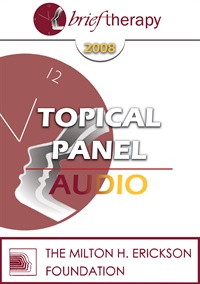
- Average Rating:
- Not yet rated
- Topic Areas:
- Topical Panels | Brief Therapy | Therapist Development
- Categories:
- Brief Therapy Conference | Brief Therapy Conference 2008
- Faculty:
- Steven Hayes, PhD | Stephen Karpman, MD | Matthew Selekman, MSW | Reid Wilson, PhD
- Duration:
- 58:40
- Format:
- Audio Only
- Original Program Date:
- Dec 13, 2008
- Short Description:
- BT08 Topical Panel 07 - Use of Theory in Clinical Practice - Steven Hayes, PhD, Stephen Karpman, MD, Matthew Selekman, MSW, R. Reid Wilson, PhD
- Price:
- $15.00 - Base Price
Please wait ...

